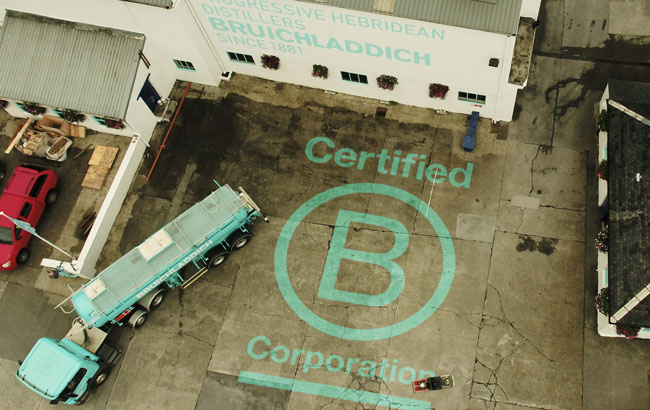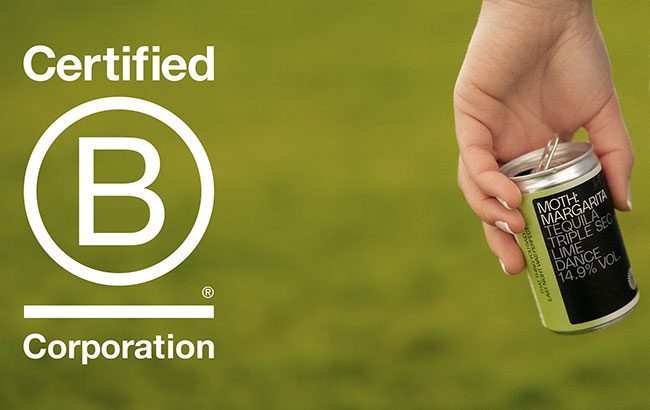What are the benefits of B Corp certification?
Gaining the prestigious B Corp certification can be a tough process, but drinks companies are keen to meet the challenge.

*This feature was originally published in the December 2023 issue of The Spirits Business magazine.
There has been a steady infiltration of a discreet logo in the business world in recent years. Companies proudly display it on their websites, communications and physical signs. This stark design, a capital B housed in a clean black circle with a definitive underline, is a declaration that the companies that brandish it are B Corp certified.
Once a rather niche certification to have, the number of businesses announcing that they have achieved the status appears to be increasing exponentially, particularly in the drinks world. But what is it, and what are the benefits of being certified?
Run by non-profit organisation B Lab Global, the B Corp certification means that a company has been assessed for its social impact, and it has achieved a high enough score to achieve the status. As B Lab declares on its website, it “is a designation that a business is meeting high standards of verified performance, accountability, and transparency on factors from employee benefits and charitable giving, to supply chain practices and input materials”.
So how does a company establish its credentials to join this respected club?
Achieving certification
A company’s eligibility is first evaluated through the organisation filling out a B Impact Assessment (BIA), a document that covers five areas: governance; workers; community; environment; and customers. “The BIA is a free online tool that any business can use – there’s around 280,000 companies in the world using it to measure their impact,” explains Amy Bourbeau, co-founder and chief impact officer of Seismic, a sustainability consultancy with offices in London and Luxembourg that specialises in supporting businesses through the B Corp Certification process. “The assessment has approximately 150 to 250 questions within it. Each of those questions is scored, and as you answer them, you see your score increasing and you need to get 80 points to be eligible to certify. For most companies, the average score [when they first fill out the assessment] is 50 points.”
Once a company’s current status has been established, it can decide on the areas it would like to improve on to achieve the 80-point requirement. The certification process is being reviewed by B Lab, and is set to change in 2025, with companies likely to be required to achieve minimum scores in each of the five areas of the BIA, rather than a minimum overall score.
Non-alcoholic drinks brand Everleaf achieved certification this year. “The process is really quite detailed and thought-provoking,” explains founder Paul Mathew. “[For example, the governance section] is all about our mission and ethics and accountability to our workers. We had to send questionnaires to all our biggest suppliers to ask what they were doing with energy and water disposal, whether they were a minority- or female-owned business. You would score more points if you work with a balanced community versus just working with companies headed up by middle-aged men like myself.”
Once they feel ready, companies submit the BIA, alongside supporting evidence, and wait for a B Lab representative to get in touch. An interview is arranged, during which further evidence might be requested, then a decision is made.
Success is not guaranteed at the first attempt, especially if you have attempted to go through the process alone. “This is a UK statistic, but I imagine it’s fairly similar elsewhere: 52% of companies that submit their assessment are not successful in their first attempt at certification,” says Bourbeau. “There are common mistakes that can contribute to that. The assessment is tailored to companies based on their size and sector. So the questions that they see are based on that – sometimes people have set themselves up on the wrong track. Sometimes people have been overly optimistic, and they’ve answered things incorrectly, which then makes their score drop [during the verification process]. I would check with an expert before you go down the wrong track.”

Bourbeau says all of Seismic’s clients that have applied for B Corp certification have achieved it on their first attempt. When asked whether B Lab Global can help guide potential applicants through the process, Bourbeau says that with 280,000 companies currently certified, some help may be provided, “but you can’t necessarily rely on them being able to answer every question that you have along the way, because that just wouldn’t be viable for them”.
Once a company has achieved certification, the story doesn’t end there – rather, it is just the start. It will have to go through a reverification process after three years. Bruichladdich – which was the first whisky and gin distillery in Europe to gain B Corp Certification – has just been reapproved.
“B Corp recertification is – quite rightly – a lengthy and rigorous process,” says Douglas Taylor, CEO of Bruichladdich. “It took us 12 months, and we had support from an external, specialist agency. Every single facet of the business is carefully assessed, from our distilling operations, emissions, and waste, right through to our sourcing, suppliers, culture and people policies. It’s a real team effort, with an internal project team overseeing the process on top of their day jobs. The B Impact Assessment has become a useful internal framework for us when it comes to monitoring, implementing, and refining our sustainability strategy. Not only does it keep us on track and focused on the future, but it holds us accountable, and forces us to make continuous progress.”
Sustainability strategy
Mathew agrees, and following Everleaf’s certification six months previously, the company has been busy implementing other policies inspired by the BIA. “B Corp has given us a lot more confidence when we’re talking about our sustainability strategy. It also led on to other things that raised a lot of areas where we thought maybe we were fine. We weren’t, and so we needed to put more stringent policies in place.”
One of the areas that Everleaf is now focusing on is measuring its carbon footprint. “Carbon footprint is not a strict part of B Corp but it’s something that they teach you a lot about as part of the whole certification process. This has led onto a partnership with an organisation called ClimatePartner, which now audits our use – we go through a bunch of calculators and measure the carbon footprint of a bottle of Everleaf, and offset that for the year ahead.
“We also measure all our carbon usage as a company for the past financial year. So that’s every time anyone’s taken a bus, through to a long-haul flight, to the carbon used in production. We have lots of very big spreadsheets we fill out to capture all that data. That’s given us a benchmark for reduction as well.”
It’s worth noting that a certified company can also lose its status at any point, however: BrewDog made headlines in 2022 when it lost its B Corp certification following the publication of an open letter from more than 60 former employees describing a ‘toxic’ working environment at the brewing and distilling company.

Business benefits
Statistics suggest that there are a range of benefits to becoming B Corp certified. Financially, 44% of B Corp firms found certification helped attract investors [B Lab 2021]; while for those raising equity finance, 70% of B Corps secured all their funding, as opposed to 56% of the wider SME community, according to Seismic. The growth rate of B Corp businesses in the UK between 2017 and 2020 is an average 26% compared with the national average growth rate of 5%.
All of the interviewees featured here spoke about the ideological importance of ensuring their organisations were working as sustainably as possible, while also having a positive social impact.
“The B Corp certification means we join a global community of companies working hard to create an inclusive, equitable and regenerative economy,” says Sam Hunt, co-founder of Moth Cocktails. “It has created great pride among our employees, and positively impacted our workplace culture, contributing to increased employee engagement and satisfaction.
Additionally, the B Corp status has opened up new business opportunities. Many like-minded businesses and partners actively seek out collaborations with B Corps, recognising the shared values that underpin our operations. This has resulted in meaningful partnerships, collaborations, and expanded distribution channels that might not have been made easily accessible without the B Corp designation.”
Taylor points to the wider responsibility of companies to the planet and community: “It’s important for all companies to consider becoming B Corp certified. Our most challenging problems cannot be solved by just governments and nonprofits alone, and companies can often do more than governments because of their long-term vision. Certified B Corp businesses meet the highest standards of social and environmental impact – ultimately balancing profit with purpose.”
Related news
Top 10 spirits for gifting this summer
